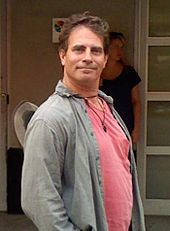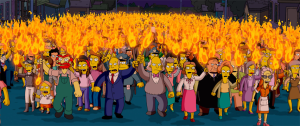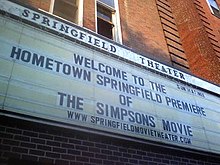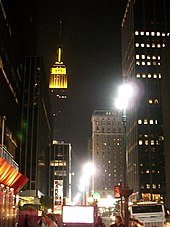The Simpsons Movie
Russ Cargill, head of the Environmental Protection Agency (EPA), informs President Arnold Schwarzenegger of Springfield's pollution crisis and presents him with five solutions.
Being trapped under the dome causes mass hysteria in Springfield and when Homer's silo is discovered on the news, hundreds of townspeople arrive at the Simpsons' house in an attempt to lynch the family.
Homer returns to Springfield and descends the rope, knocking the escaping townspeople and the bomb off, inadvertently shortening its countdown and further provoking the town's ire.
Former writer Conan O'Brien expressed interest in working with the Simpsons staff again, although he later joked that "I worry that the Simpsons-writing portion of my brain has been destroyed after 14 years of talking to Lindsay Lohan and that guy from One Tree Hill, so maybe it's all for the best.
[22] Hank Scorpio, a character from the 1996 episode "You Only Move Twice", was originally meant to return as the main antagonist, but the staff dropped the idea and created Russ Cargill instead.
Jean, Scully, Reiss, Swartzwelder, Vitti, Mirkin, and Meyer wrote 25 pages each, and the group met one month later to merge the seven sections into one "very rough draft".
[28] Director David Silverman said that unlike the TV series where "you [have] to pick and choose", the film gave them the opportunity to "lavish that attention [on] every single scene".
[19] Silverman and the animators looked to films such as The Incredibles, The Triplets of Belleville, and Bad Day at Black Rock for inspiration, as they were "a great education in staging because of how the characters are placed".
[26] The series' regular voice actors: Dan Castellaneta, Julie Kavner, Nancy Cartwright, Yeardley Smith, Hank Azaria and Harry Shearer, as well as semi-regular performers Tress MacNeille, Pamela Hayden, Marcia Wallace, Maggie Roswell, Russi Taylor and Karl Wiedergott, reprised their roles.
[7] Joe Mantegna returned as Fat Tony,[31] while Albert Brooks, who supplied many guest voices in episodes, was cast as the main antagonist Russ Cargill[16] after he told the staff that he wanted to be part of the film.
[22] Although he does not provide the voice, Arnold Schwarzenegger is president of the United States rather than the contemporary real-life incumbent George W. Bush, because according to Groening "in two years ... the film [would be] out of date".
[26] A car chase in which Homer throws flaming mummies out of a truck at the EPA was replaced with "more emotional and realistic" scenes at the motel and carnival that allowed for a change of pace.
[26] Russ Cargill was redesigned several times, originally appearing as an older man whose speech patterns Albert Brooks based on Donald Rumsfeld.
[26] Other deletions included Homer's encounter with a sausage truck driver, a scene with Plopper the pig at the end,[38] and a news report, showing the dome's effect on daily life in Springfield in areas such as farming and sports, all of which were featured on the DVD, were cut because they did not fit the overall context of the film.
He wrote that the film's first post-opening credits scene, which sees Green Day fail in an attempt to engage their audience on the issue of the environment, "sets in motion a plot expressly built around cultural agenda-setting" and "reflection on timely 'issues'.
[46] Mark I. Pinsky, author of The Gospel According to The Simpsons, said the film "treats genuine faith with respect, while keeping a sharp eye out for religious pretension and hypocrisy of all kinds".
In analyzing the role of Ned Flanders, he wrote, "It is [the] willingness of The Simpsons to depict all the different sides of us [...] that makes it so rich and funny on our complicated relationship with religion.
[26][52] When Bart is riding his skateboard naked, different passing objects are almost constantly covering his genitalia, a nod to similar techniques used in Austin Powers: International Man of Mystery.
[50] The bomb disposal robot was based on Vincent D'Onofrio's character Leonard "Pyle" Lawrence from the film Full Metal Jacket, who commits suicide in a similar way.
[53] As Homer leaves Eski-Moe's he grabs on to a passing truck and uses it to propel himself back to the house, a tribute to actor Buster Keaton,[26] while the epiphany scene features homages to the film Brazil and the works of Salvador Dalí.
The site's critical consensus reads, "The Simpsons Movie contains the hearty laughs, biting satire, and honest portrayal of an American family that makes the show so popular.
The Times' James Bone said that it "boasts the same sly cultural references and flashes of brilliance that have earned the television series a following that ranges from tots to comparative literature PhDs".
[91] The Guardian's Peter Bradshaw stated that it "gives you everything you could possibly want" and that he thought, "Eighty-five minutes [was] not long enough to do justice to 17 years of comedy genius".
[95] USA Today film critic Claudia Puig said that the story did "warrant a full-length feature, thanks to a clever plot and non-stop irreverent humor".
[96] Patrick Kolan believed that the film was "easily the best stuff to come [from the Simpsons] since season 12 or 13" and praised the animation, but also said that the appearances of characters such as Comic Book Guy and Seymour Skinner were "small and unfunny".
[97] Kirk Honeycutt of The Hollywood Reporter praised the film's good nature, stating that the laughs "come in all sizes", but also noted that, "little has been gained bringing the Simpsons to the screen.
"[98] Variety's Brian Lowry called it "clever, irreverent, satirical and outfitted" but that it was "just barely" capable of sustaining a running time longer than a television episode.
[106] This assessment was shared by Carina Chocano of the Los Angeles Times, who felt that "once the movie wanders into its contemplation of mortality and meaning, the trenchancy kind of creaks and falls off."
She negatively compared it to South Park: Bigger, Longer & Uncut (1999), a film similarly adapted from an animated television series, saying that, in terms of satire, it offers "nothing we don't hear every night on The Daily Show with Jon Stewart.
[141] On July 22, 2019, Groening stated that he had "no doubts" that The Walt Disney Company, which acquired 21st Century Fox early that year, would likely produce a sequel one day.







